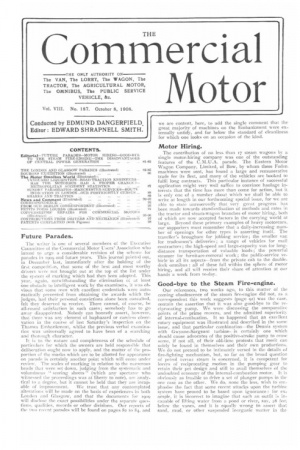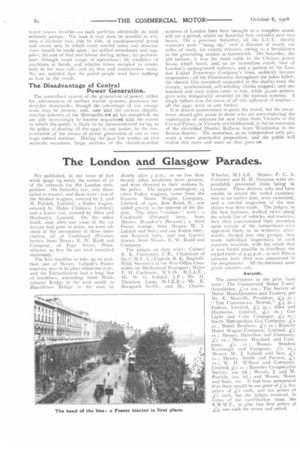Good-bye to the Steam Fire-engine.
Page 1

Page 2

If you've noticed an error in this article please click here to report it so we can fix it.
Our references, two weeks ago, to this matter of the corning obsolescence of the steam fire-engine did not, as a. correspondent this week suggests (page 92) was the case, contain the assertion that it was also good-bye to the reciprocating pump. We were discussing the comparative points of the prime movers, and the admitted superiority of internal-combustion. It so happened that an excellent rotary equipment was illustrated and described in the same issue, and that particular combination—the Dennis system with Gwynne-Sargeant turbineis certainly one which should cause advocates of the positive-stroke pump to cease some, if not all, of their old-time protests that merit can solely be found in themselves and their own productions. We do not pretend to be intimately versed in the details of fire-fighting mechanism, but, so far as the broad question of petrol versus steam is concerned, it is compeLent for lovers of reciprocating motion in the pumping gear to retain their pet design and still to avail themselves of the undoubted economy of the internal-combustion motor. It is obviously as feasible to drive a set of plunger pumps in the One ease as the other. We do, none the less, wish to emphasise the fact that some recent attacks upon the turbine system have proved to be based upon ignorance : for example, it is incorrect to imagine that such an outfit is incapable of lifting water from a pond or river, say, 28 feet below the vanes, and it is equally wrong to assert that sand, mud, or other suspended inorganic matter in the
water causes trouble—as such particles admittedly do with ordinary pumps. XVe hope it may soon be possible to witness a six-hour run, side by side, of equal-powered petrol and steam sets, in which event careful notes and observations should be made upon : (a) skilled attendance and supplies; (b) cost of fuel and labour during action; (c) performance through usual range of operations; (d) condition of machines at finish, and relative times occupied to render both lit for next call; and (e) first and maintenance costs. XVe are satisfied that the petrol people need have nothing to fear in the result.


















